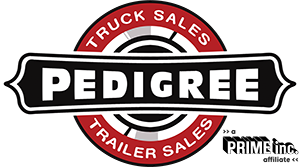One of the reasons some will purchase a brand new semi-truck is that it comes with a warranty from the manufacturer.
But what if you’re hoping to save some money by choosing a quality used truck? Some used semi trucks do come with a warranty but the terms will vary.
For example, when purchasing a used semi-truck from Pedigree, the balance of the manufacturer’s warranty applies:
- All genuine DDC engine parts up to 4 years or 600,000 miles
- Starter, alternator, air compressor 4 years or 600,000 miles
- Air conditioner, heater 4 years, or 500,000 miles
- Transmission 5 years, or 750,000 miles
An extended warranty offers coverage that extends beyond the manufacturer’s initial warranty. Here are seven important questions to ask if you’re considering an extended warranty for your truck.
#1: How old is the truck?
Not every used truck will qualify for an extended warranty.
Ask different providers about their eligibility restrictions, which generally include two criteria:
- If the truck has too many miles — the limit is usually 750,000 or 600,000
- If the truck is too old — most commonly up to 10 years
#2: How long do you plan to use the truck?
The longer you keep the truck, and the more miles you put on it, the more likely you are to exceed the time and mileage limits of the original warranty.
- If there are only 2 years left on the warranty and you’d like to keep the truck in service for 5, an extended warranty is probably a good idea.
- Are you leasing or purchasing the vehicle? An extended warranty is usually not needed if you lease, especially for 3 years or less.
- How many miles will the truck run? Hauling cargo cross country will eat up your warranty miles a lot quicker than running deliveries across town. The more miles you’re logging, the more likely you’ll want an extended warranty.
#3: How many trucks do you have?
The fewer vehicles in your fleet, the more you may benefit from an extended warranty. Why is that the case?
Carriers with large fleets enjoy a few advantages that make them less likely to need an extended warranty.
- They are more likely to purchase newer vehicles that don’t break down as often
- They tend not to keep vehicles as long and are less likely to outlive the original warranty
- They are better able to spread the risk across a larger pool of vehicles
For the smaller trucking company, a single catastrophic repair could do more damage to the bottom line. In addition, small carriers tend to keep vehicles longer, which means they have older trucks that are likely to need repairs and outlive their warranties.
#4: What conditions will the truck be driving in?
In addition to the number of miles driven each year, the conditions the truck drives through may influence the likelihood of needing repairs and replacement.
Here are a few factors to consider:
- Duty cycle — will you drive primarily over the road or in stop and go traffic?
- Terrain — rough, smooth, hilly, flat?
- Climate — exposure to extreme cold or hot temperatures?
#5: Should you choose an OEM or third-party extended warranty?
You have the option of purchasing an extended warranty from the manufacturer who built your truck, or from a third-party service provider.
- With an OEM warranty, there’s generally less risk that the company will go out of business. For a third-party or aftermarket extended warranty, make sure you’re buying from a reputable service provider.
- Make sure the warranty covers all of the services and parts you’ll actually need. An OEM warranty means you get new factory parts. If you’re looking at an aftermarket warranty, find out if they use parts that are compatible with your truck.
- Consider how far you’ll have to travel to have the truck serviced. An OEM warranty may require you to only visit the factory or dealership for service, while a third-party warranty may offer a larger network of service providers, so you’re more likely to find a qualified mechanic close by in the event of a breakdown.
#6: What services are included or excluded?
Extended warranties cover manufacturer defects and vary in terms of the services covered and components that can be repaired or replaced.
- Ask about specific items such as the drivetrain, electronics, and air conditioning.
- Does the warranty include roadside assistance?
- Does the company offer a rental car benefit?
- Is the policy transferable in case the vehicle is sold?
#7: What are the details?
Make sure you read the fine print and understand all terms of the warranty before signing an extended warranty contract.
Here are a few priority items to ask about:
- What is the deductible — that is, your out-of-pocket cost for repairs?
- How are claims paid? Do they pay at the time of service or reimburse you later?
- What is the cancellation policy? If your truck is sold, you should receive a prorated refund for the unused portion of the warranty.
Is an extended warranty the right choice for your semi-truck? Pedigree is proud to offer extended warranties that keep you protected in case something unexpected happens. Additionally, our used semi-trucks for sale include OEM warranties from Freightliner and Peterbilt.
Contact Pedigree and we’ll discuss your options so you can get the service you need at a cost that works for you.

